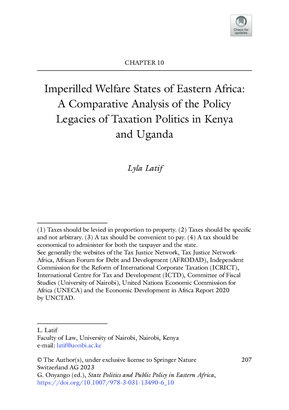Imperilled Welfare States of Eastern Africa: A Comparative Analysis of the Policy Legacies of Taxation Politics in Kenya and Uganda

This chapter uses Kenya and Uganda as its case studies to reveal how the colonial administration during independence reconstituted the existing political and legal relations ‘in terms of imperatives and then gave them back to the people as their own’ (Fitzpatrick 1985, p. 479). This inevitably predisposed Kenya, Uganda and other Eastern African states to a particular pattern of economic development—where the burden of taxation fell on the citizens, whereas the benefits from domestic resource extraction that were accrued were guaranteed for foreign investors. This may also explain why today, taxation is not entirely crafted on the realisation of effective public policy delivery. The state is yet to match tax mobilisation with the practical aspirations of the people, resulting in policy implementation deficits (see Onyango and Hyden 2021). Against this background, this chapter discusses how the colonial tax model adopted by the independent governments of Kenya and Uganda, as other former colonies, ensured that the British colonial legacy remained intact and but tressed from re-organisation to enhance the welfare aspirations of these countries. The chapter is structured as follows: it discusses the problem of an acquired post-colonial tax system pinpointing the inequalities that it introduces. It then considers these inequalities in the context of tax asymmetries that distinguish between native and foreign capital in granting tax privileges. A discussion addressing the disconnect between the Kenyan and Ugandan tax policy and the achievement of social welfare follows before a conclusion. The chapter shows how despite incremental transformations in response to the current contexts, the colonial tax system replaced by the Kenyan and Ugandan governments established a fiscal relationship that treated individuals according to class and economic structures, thereby restraining tax power in redistribution.
